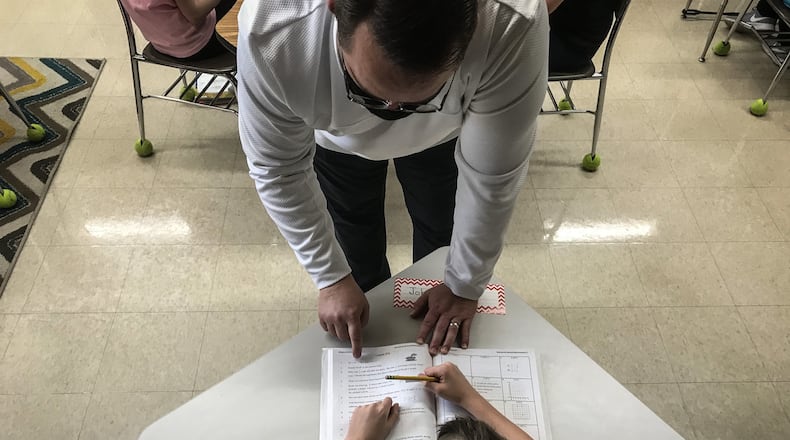During the remote period, technology was one of the biggest challenges to helping kids succeed, especially early on, Orchard Park Elementary teacher Andy Ayres said.
“Some kids had great WiFi and some struggled … Zooming and being able to watch videos and do work would kind of slow them down,” Ayres said. “We made improvements with that throughout the time that we were remote, and the kids started to succeed at the end and were able to do that work at a high level.”
Ayres cited regular diagnostic testing as a key to finding each child’s strengths and weaknesses so teachers can respond. Assistant Superintendent Dan Von Handorf said that’s been a focus for Kettering for years, pointing also to the district’s Response to Intervention program.
Von Handorf said monthly RTI meetings continued for each school, during remote and in-person times, to review individual student data and provide targeted intervention based on what each child needs.
Credit: JIM NOELKER
Credit: JIM NOELKER
Teacher feedback, student grades and attendance are used to monitor student progress in Kettering, along with three-times-a-year diagnostic tests. Von Handorf was excited to see students in grades 2-8 this year showing reading and math growth similar to previous years on those tests.
“Our teachers, parents and students have done an amazing job with remote learning,” he said.
Other areas definitely need work, Von Handorf said. More high school students received failing grades during remote learning than in previous years, he said, so that’s a big focus both right now and for the summer to keep kids on track for graduation.
Also, not surprisingly, many kindergarten and first-grade students struggled to gain literacy skills during remote learning. So kindergarten and first grade reading and math will be the district’s primary focus for extended school day and summer programming at elementary schools. Von Handorf said those programs are being designed right now.
At a school board meeting last month, Carrie Hennessy, a multi-tiered supports leader in Kettering schools, told the board that educators as a whole are “all scrambling to catch up. We’re not going to catch up for a really long time,” she said.
Cary Forlines’ first-grade class was working hard on a reading activity Tuesday at Orchard Park, with 16 students in-person and three others watching online. COVID still presents challenges, as students sit four to a table, talking to each other through clear partitions. Forlines kept everyone active, but kept reminding students on a carpet area to spread out.
Meanwhile Ayres taught math to 20 in-person fifth-graders, energetically taking students step by step through challenging fraction-based word problems. It looked almost normal — many students engaged, a few distant, a few being reminded to stop talking — except for the masks and the odd room configuration.
Ayres took the individualized approach to heart, working the room and checking every student’s understanding at some point in the class. He called the students resilient and encouraged them to be thinkers and problem-solvers.
One of the biggest advantages to having them back together, he said, is hearing them work together, where one student grasps part of a problem, making the light go on for the other one.
Staff Writer Nick Blizzard contributed to this story.
About the Author


